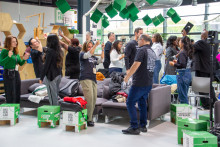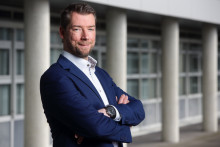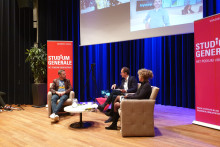The agreement was signed before the summer holidays, and publicly announced by the King’s Commissioner for Overijssel Andries Heidema during Monday’s Opening of the Academic Year ceremony. ‘It’s something we’ve been working towards for several months,’ says Frank Kresin, the Director of the DesignLab. ‘I believe it is the first ever collaboration between a university and a province of its kind and I think it will benefit the whole UT.’
Looking for answers together
‘Governmental organizations have a lot of questions that need to be explored and they would like us to look for answers together,’ continues Kresin. ‘These questions include topics of energy transition, climate adaptation, democratic participation and digital technologies, using these to strengthen rural and urban communities. As a university, we can offer our research expertise, students ideas and the “Science2Design4Society” methodology and really make a difference. In some cases these will only be short explorations, while others will lead to longer research and development programs.’
Kresin points out that although the DesignLab is specifically mentioned in the agreement, it will require a close cooperation with many research institutes and faculties at the UT. ‘We have the methodology and the network, but the expertise lies within the faculties and the research institutes. And the input from a lot of different disciplines will be necessary, starting with behavioral sciences and ending with engineering.'
Matchmaking phase
The agreement will last until 2022 and the collaboration is now in what Frank Kresin calls ‘the matchmaking phase’. ‘We are defining specific research questions and approaches and looking for the right people to involve in each one. The first projects should start at the beginning of 2019. I believe it will really help the university to do our part in society, to get our hands dirty with problems people are experiencing right now, and come with meaningful answers.’







